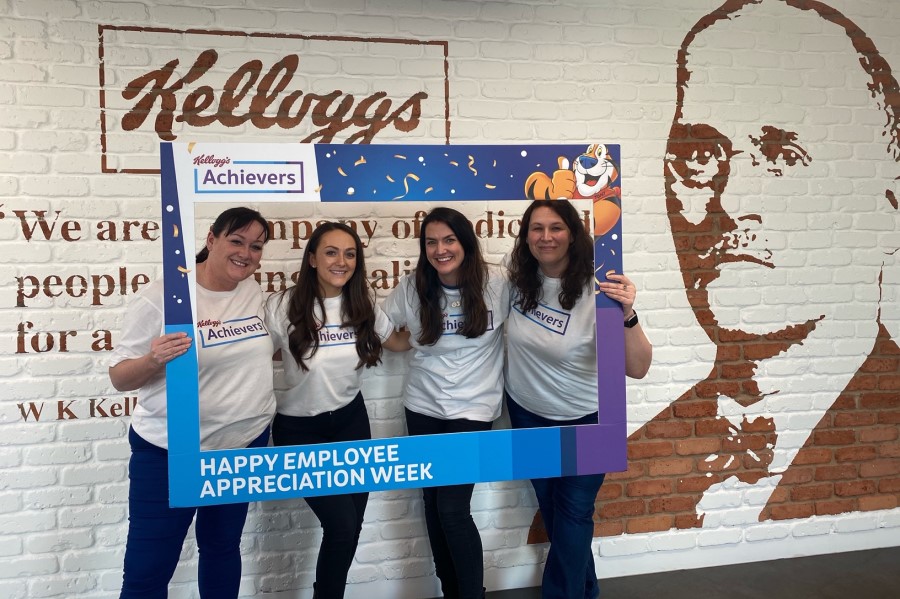Jody Foster senior European reward manager at Kellogg’s on creating a culture of recognition

A new approach to recognition
In 2017 the company appointed a new CEO and deploy for growth strategy fueled by the belief that ‘our people are our most competitive advantage’. The international food manufacturer had been steadily growing and expanding, and it had become apparent that its approach to recognition had become varied and inconsistent. Additionally, employees reported wanting more regular feedback and a common way to show their appreciation to their colleagues.
These objectives led the company to invest in a global recognition and engagement platform, which it calls Achievers. “Achievers’ empowers employees to recognise and reward each other in real time and aligns our employees with our company’s values and goals. We set out to inspire employee loyalty and increase engagement and performance, and we’ve seen this vision come to life,” says Sanjay Patel, Kellogg’s VP of Global Total Rewards.
Creating a culture of recognition at Kellogg
In 2018, Achievers was launched in North America and by January 2020, it was rolled out globally. It aimed to encourage employee-to-employee and leader-to-employee recognition by allowing anyone to provide recognition at any time. It also enabled recognition to be visible across the organisation to recognise and reinforce behaviours aligned with its business strategy and K Values.
The Kellogg Achievers programme is essentially an internal social media platform with a “feed” of publicly posted recognitions. Employees can customise their newsfeeds to see the groups most relevant to them. They also can like, comment on, and boost recognitions, which is an especially popular feature among team leaders and executives to reinforce results.
“At Kellogg’s we believe that a culture of recognition will increase pride and loyalty and lead to a happier, more inspired workforce. This will drive a high performance workplace,” says Foster.
Ongoing recognition
The Employee Appreciation Week is part of the drive to further promote the importance of employee recognition. The week-long calendar of events includes: an Appreciation Breakfast with special recipe creations, such as Celebratory Cornflakes and Well Done Wheats, that include Kellogg’s cereals and other special ingredients; the attendance of leaders to the breakfast, to show their appreciation; an afternoon tea with treats baked by colleagues to share with others in appreciation; and a morning of free coffee.
“At Kellogg’s we are committed to better creating a culture of recognition, so this was an opportunity to remind people at our various campuses of the importance of showing gratitude for great work. It also gave us a chance to remind people about our recognition platform Achievers and drive people to use this during the week.
“Since 5 November 2019 we have seen 18,000 recognition moments [across Europe] but we want to boost this even more. We have given all our employees special employee recognition points to award to a colleague to show their appreciation this week (normally only managers have points),” explains Foster.
The points can be redeemed for gift cards, charitable donations, travel, merchandise, and much more. And, since the platform was introduced in the UK, it has had a big impact on the way that employees show their appreciation to each other.
“It has led to more consistent, regular meaningful recognition across teams, locations, functions, up and down the organisation. The platform also allows for visibility of these moments which reinforces the behaviours and actions that are at the core of our culture. We can also link the platform to support other activity in the business. For example, on International Women’s Day we will ask colleagues to recognise people that have shown courage to better drive gender balance at Kellogg’s,” concludes Foster.
Tips for creating your culture of recognition
Having gone through the process of implementing a global recognition programme, there are a few things that the team at Kellogg’s has learned along the way. Whether you create a custom programme or purchase an existing platform to boost recognition, here are some suggestions from their team to help make your efforts successful.
1. Leadership must support your goal of creating a culture of recognition. Their engagement is essential for the programme to be genuine and well received.
2. Align on your vision first. For example, Kellogg’s wanted high frequency of recognition with low rewards to encourage the day-to-day behaviours that make big wins possible, so it designed a solution around this outcome.
3. Enable public, peer-to-peer recognition. Find a way to celebrate employees in a way that gets them increased visibility AND allows anyone to give or receive recognition.
4. Consider monetary recognition. Research from Gallup found that employees most appreciate recognition that has monetary value, regardless of how small. For the most impact, it recommends giving all employees the ability to send modest monetary recognition to their peers. Most of Kellogg’s awards are in the USD$5-$10 range, and leaders can boost these amounts with their budgets if they see fit to do so.
5. Launch it in a big way. Kellogg’s launch days were action packed with Achievers Champions staffing kiosks, awarding extra points for employees sending their first recognitions, fun trinkets, lots of hands-on support and leader encouragement. It recommends creating a lot of enthusiasm as you build your recognition journey from the very first day.
6. Keep the momentum going. To regularly remind people about the importance of recognition, Kellogg’s host special campaigns and challenges. For example, in November, it challenged staff to recognise three people they are thankful for in honour of the U.S. Thanksgiving holiday.






